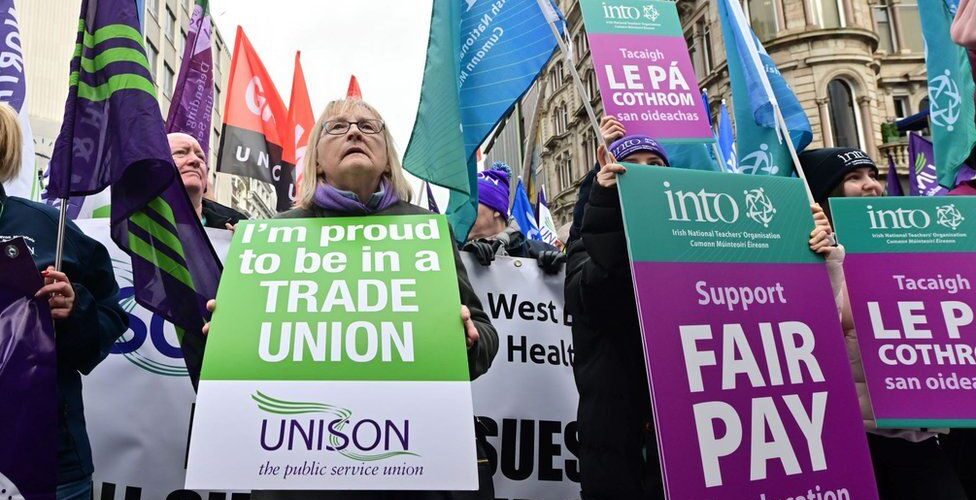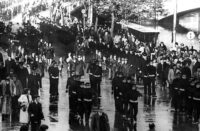150,000 public sector workers recently undertook a 24-hour strike across the North. The demand was principally in relation to pay. Adding fuel to worker discontent are strained public services, which impact labour effort via intensification but also relativity of pay. Northern Irish workers’ salaries compare unfavourably to equivalents in Britain. That had not always been the case, due to pay parity drives by local unions in the teeth of opposition from local capitalists who feared it would create labour shortages in the private sector. Budgetary constraints in recent years, the lack of an Executive, inflation and the punishment budget have aggravated claims on relativity. An absent Executive impacts industrial relations because industrial relations is a devolved matter: if in place, ministers would receive direction from public sector pay review bodies (a problematic structure in itself) and set a pay policy for negotiation with the unions. In absentia, no movement.
Some republican socialists responded to Northern workers’ demand for pay parity with their co-workers in Britain by arguing that people in the North “need to decolonise their minds, forget about Britain, and turn their attention to building a united Ireland as envisaged in the 1916 Revolution” (Trade Union Left Forum, X.com, January 20th). “Wrap me in the green flag” arguments are not much comfort to workers in the North who, despite selling their labour power to effectively the same employer, not only get paid less for their labour effort but then have income tax deducted from those lesser wages at the same rate as everyone else in the relevant tax jurisdiction and currency zone. Not only does such republican socialist condescension put nationality before class, it weakens genuine efforts to connect the national with the social.
However, constitutional issues do cast a shadow. Union ire was directed at the Secretary of State – an easy avenue as everyone in the North hates the Tories. One union official claimed that local politicians were “irrelevant” in the dispute. The argument was workers should not be subjugated to the whims of politicians in a cost-of-living crisis. The argument is partially misplaced and could have been extended in a direction unions did not really want to go. Even in narrow terms, disentangling public sector industrial relations from the politics of government as employer is difficult. By resorting to economism, unions vacated a political space during a crisis and hung onto the coattails of politicians. Yet one day, indeed several days of strikes, do not generate pressure on a soon exiting Tory minister unaffected by voter sentiment in the North. Unions exercise power over those who need their votes.
Despite the devolved administration’s obvious weaknesses, one should not throw the baby out with the bathwater. Its absence curtails local political democracy and hurts the region’s people in other ways. While one could take something “minor” like the delayed rollout of energy payments last year, in more substantive terms, the absence of the Assembly has led to the North falling behind on zero-hour pay reform, workplace consultation rights and rights for agency workers. Indeed, the sitting of the Assembly testifies to the above in other ways; the reason why Northern Irish workers could strike through simple majority voting is because the Assembly refused to implement the Tories’ 2016 Trade Union Act. Local politicians did so to avoid upsetting the union constituency upon which both power blocs draw. Might unions exploit this reliance more?
That might involve grasping nettles on communal identity matters – long aspired towards and easier said than done. Directing ire locally via a mass campaign might have delivered benefits: allowing unions to take a political lead, advancing the importance of class above constitutional identity, carving out an actual space as the progressive third force in the region rooted in working people’s perspectives. Pressure on local actors might have encouraged, simultaneously, a return to devolved administration and released funds. Despite the limitations of both surely better democratic structures locally than direct control; surely better some available money to ease short-term pain than none. Such a stance might have pushed unions onto the political stage and begun a much-needed labour movement vision of the various economic, financial and political problems afflicting our people.






